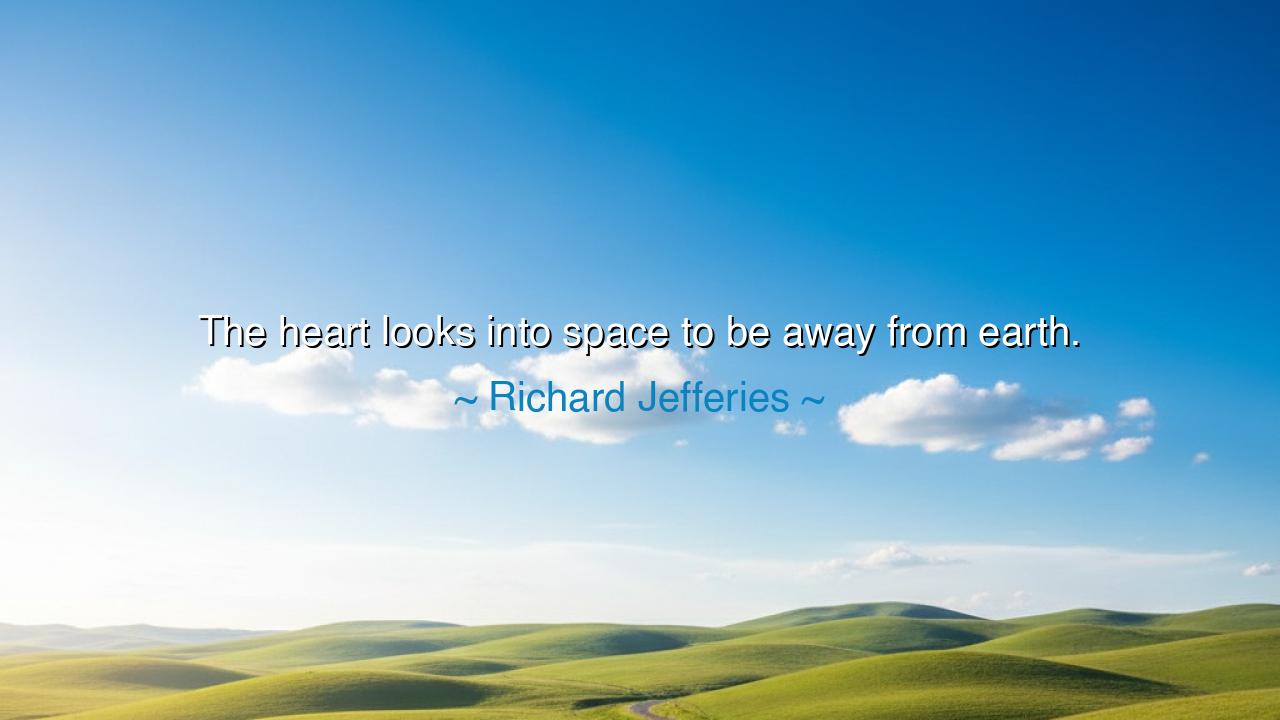
The heart looks into space to be away from earth.






"The heart looks into space to be away from earth." — these evocative words by Richard Jefferies speak to the deep yearning of the human spirit to transcend the confines of the earthly realm and reach for something greater, something beyond the ordinary, beyond the burdens of daily life. There is an inherent longing in the human heart, a desire to escape the limitations and sorrows that life on Earth often brings, and to gaze toward the infinite possibilities of the cosmos. Jefferies' words remind us that the act of looking into space, whether literally or metaphorically, is not just a pursuit of discovery, but a deep, spiritual escape, a reaching for freedom, peace, and understanding that we cannot always find in the chaos of our daily existence.
In the ancient world, the stars were viewed not just as distant points of light, but as symbols of hope and mystery. The Greeks, for example, looked to the heavens with awe and reverence, believing that the gods themselves resided among the stars. For them, the cosmos was both a place of divine power and a space for human imagination. To look at the night sky was not just to behold beauty, but to reach for something higher, something beyond human comprehension. Pythagoras and his followers sought not only to understand the mathematical structure of the universe but also to tap into the deeper harmony of existence. In this sense, space—the very concept of the stars—was a place for the heart to wander, a domain where the soul could find peace and inspiration far beyond the confines of the world.
The heart, as Jefferies notes, looks into space as a means of escape. We all have moments when we are weighed down by the responsibilities, the fears, and the limitations of our lives. These struggles—whether personal, societal, or existential—can make the world feel suffocating, heavy, and even imprisoning. Space offers a vision of something boundless, a realm where there is no boundary between the possible and the impossible, no limit to the dreams that can unfold. The stars in the sky, distant though they may be, remind us that we are part of something much larger, much more grand than the struggles we face on Earth. In this way, looking at space is not just an escape, but a way of reconnecting with the limitless potential that lies both within us and in the universe itself.
Thomas Edison, in his pursuit of invention, embodied this very same principle. He was often said to have been inspired by the very thought of discovery—of finding new ways to solve problems, to reach beyond what was known. His inventions, like the light bulb and the phonograph, were born from this unquenchable desire to transcend the boundaries of current knowledge. Edison’s mind, ever reaching toward the heavens, embodied the idea that the human heart, like the ancient explorers who set their sights on distant lands, yearns to push forward, to reach toward the stars. The same spirit drives astronauts today, who venture into space not just to explore, but to give us a glimpse of what lies beyond, to remind us of the vastness of the universe and the boundless nature of human imagination.
Jefferies’ statement also holds a reflection on the transcendence of the human soul. To look into space is not merely a physical act, but an emotional and spiritual one. It is a means of escaping the daily toil and finding solace in the mystery of the cosmos. For astronauts like Yuri Gagarin, the first human to orbit the Earth, space became a place of reflection, where the earthbound concerns of war, division, and oppression seemed so small in the face of the vast and unified beauty of the planet below. Gagarin, gazing down from space, found himself in awe of the planet, realizing that despite the divisions among men, the Earth itself was a singular entity, bound together by the forces of nature, life, and love.
The lesson in Jefferies’ words is one of aspiration and hope. Just as the heart longs for freedom and a place of peace beyond the boundaries of the world, so too must we seek moments to rise above the difficulties we face. Whether it is through art, invention, or simply a moment of quiet contemplation, we must look to the heavens for inspiration and solace. Space is not just a physical destination; it is a metaphor for the unbounded potential that lies within us all. In the vastness of the universe, we are reminded that our struggles are small, our time short, and yet our capacity for greatness is endless.
As we navigate our own lives, let us remember that the heart, like Jefferies’ poetic insight, will always seek a higher purpose. Let us strive to look beyond the limits of our immediate concerns and toward the stars—to the limitless potential of what we can achieve as individuals and as a collective. Whether in creative pursuits, scientific endeavors, or personal growth, we must allow our hearts to reach for the cosmic expanse of possibilities, knowing that in doing so, we engage in a timeless act of human flourishing. Just as the ancient philosophers gazed upon the stars with wonder, so too must we, as seekers of truth and wisdom, set our sights on what lies beyond the known, and in doing so, transcend the limitations of the world beneath our feet.






AAdministratorAdministrator
Welcome, honored guests. Please leave a comment, we will respond soon